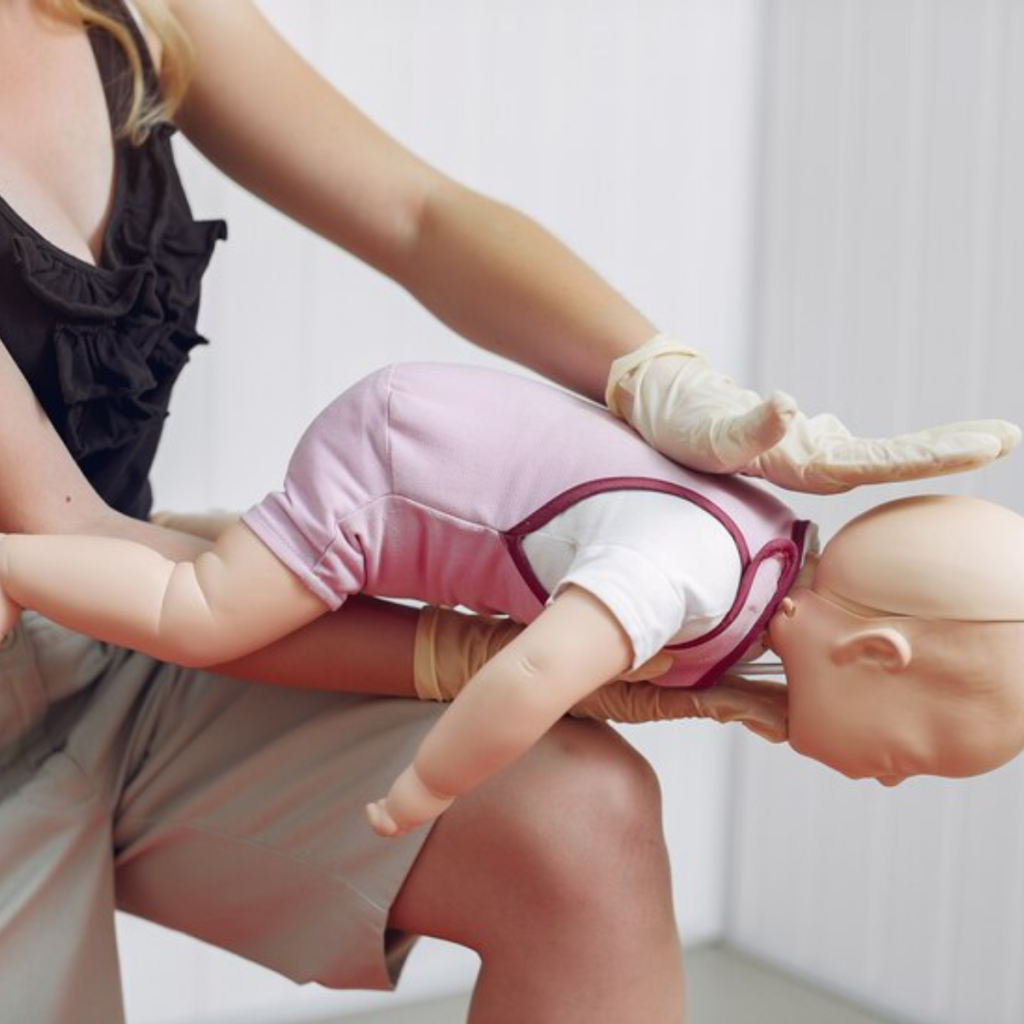Discover the potential link between carrying or lifting a baby incorrectly and back pain.
Can Carrying or Lifting a Baby Incorrectly Cause Back Pain?
Babies are bundles of joy, but they can also be bundles of back pain if we’re not careful. Many parents and caregivers are all too familiar with the aches and strains that can come from carrying and lifting our little ones. But just how much truth is there to the notion that improper baby handling can lead to back problems? Let’s dive into the fascinating world of back pain and explore what impact carrying and lifting a baby can have on our backs.

Understanding the Basics of Back Pain
Before we can uncover the connection between baby handling and back pain, it’s important to grasp the fundamentals of back pain itself. The anatomy of our back plays a vital role in how it functions and how it can become susceptible to discomfort.
Our backs are truly marvels of engineering. Comprised of a complex network of bones, muscles, and ligaments, the back provides support, stability, and mobility. The spine, consisting of vertebrae and discs, acts as the backbone (pun intended) of this intricate structure.
However, this intricate design also means that our backs are prone to problems. Poor posture, weak muscles, and injuries can all contribute to back pain. And yes, how we carry and lift our little ones can also play a role.
When it comes to back pain, there are various factors that can contribute to its occurrence. It can stem from muscle strains or sprains, herniated discs, arthritis, or even just the wear and tear of everyday life. With the physical demands of caring for a baby, it’s no wonder that many parents find themselves experiencing back pain.
But is lifting and carrying a baby really to blame for all those aches and pains? Let’s explore the connection.
The Impact of Baby Handling on Back Pain
As parents, we often find ourselves constantly lifting and carrying our little ones. From picking them up out of their cribs to carrying them around the house, these repetitive movements can take a toll on our backs.
When we lift a baby, we often bend forward, putting strain on our lower back muscles. This can lead to muscle imbalances and discomfort. Additionally, the weight of the baby can place extra pressure on the discs in our spine, potentially causing herniation or irritation.
Furthermore, the awkward positions we sometimes find ourselves in while tending to our babies can also contribute to back pain. Whether it’s leaning over a changing table or reaching into a crib, these movements can strain our back muscles and lead to discomfort.
It’s important to note that while baby handling can contribute to back pain, it’s not the sole cause. Factors such as pre-existing back conditions, overall fitness level, and posture also play a significant role in the development of back pain.
So, what can we do to minimize the impact of baby handling on our backs? Stay tuned for our next article, where we will explore practical tips and techniques to help prevent and alleviate back pain associated with caring for a baby.
The Connection Between Lifting and Back Pain
We’ve all experienced the consequence of lifting something heavy the wrong way: a sudden twinge in our back that reminds us of our mistake. The same principle applies to lifting a baby.
When it comes to lifting a baby, it’s important to understand the impact of incorrect lifting techniques. Lifting a baby incorrectly can put unnecessary strain on your back, leading to pain and discomfort. Bending at the waist instead of using your legs and core muscles can place excessive pressure on the spine, resulting in those all-too-familiar aches.
Remember, your body is not just carrying the weight of your adorable little one, but it’s also maintaining balance and stability. Proper lifting techniques are essential to ensure you’re not putting excessive stress on your back.
The Impact of Incorrect Lifting Techniques
Improper lifting techniques can have a significant impact on your back health. When you lift a baby incorrectly, you not only risk straining your back muscles but also put pressure on the discs in your spine. These discs act as shock absorbers between the vertebrae, and when subjected to excessive force, they can bulge or herniate, causing intense pain and discomfort.
Additionally, incorrect lifting techniques can lead to muscle imbalances. When you rely solely on your back muscles to lift, you neglect the importance of engaging your leg and core muscles. Over time, this can lead to muscle imbalances, where certain muscles become overworked and others become weak. These imbalances can further contribute to back pain and increase the risk of future injuries.
How Lifting a Baby Can Strain Your Back
Not only can improper lifting techniques cause back pain, but the repetitive nature of lifting and carrying a baby can compound the strain. A baby grows quickly, and as they become heavier, the pressure on your spine increases.
Combine this with sleep deprivation, lack of exercise, and the physical demands of caring for a baby, and it’s no wonder many parents find themselves with back pain. Sleep deprivation can affect your body’s ability to recover and repair, making it more susceptible to injuries. Lack of exercise can weaken your muscles, making them less able to support your spine during lifting activities.
Furthermore, the physical demands of caring for a baby can involve frequent bending, twisting, and reaching, all of which can put additional stress on your back. Whether it’s changing diapers, lifting the baby in and out of a crib, or carrying them around, these activities can take a toll on your back if not done with proper form and technique.
But fear not, there are steps you can take to alleviate and prevent this discomfort. By incorporating exercises that strengthen your core and back muscles, practicing proper lifting techniques, and seeking help when needed, you can minimize the risk of back pain and enjoy the precious moments with your little one without unnecessary discomfort.
The Role of Carrying a Baby in Back Pain
Lifting may be a culprit in back pain, but carrying a baby can also contribute to those unwelcome twinges and aches. The way you hold and support your little one can impact the strain on your back.
Did you know that carrying a baby on your hip or back may seem second nature, but it can place a significant burden on your spine? The asymmetrical weight distribution can lead to muscle imbalances and strain on one side of your back. This can result in discomfort and even chronic pain if not addressed properly.
Additionally, reaching forward or hunching over to attend to your baby can further exacerbate the stress on your back. The repetitive nature of these movements can gradually take a toll over time. It’s important to be mindful of your posture and body mechanics when interacting with your little one.
The Stress of Carrying a Baby on Your Back
Carrying a baby on your back is a common practice in many cultures around the world. It allows parents to have their hands free while keeping their baby close. However, it’s essential to understand the potential impact it can have on your back.
When you carry your baby on your back, the weight is concentrated on a smaller area of your spine, which can increase the pressure on your vertebrae. This can lead to discomfort and strain, especially if you’re carrying your baby for extended periods.
Furthermore, the repetitive motion of lifting your baby onto your back and adjusting the carrier can put additional stress on your back muscles. Over time, this can contribute to muscle imbalances and potentially lead to chronic pain.

Proper and Improper Ways to Carry a Baby
So, how can you carry your baby without straining your back? It’s all about adopting proper body mechanics and finding the right tools to assist you.
- First and foremost, maintain good posture. Stand tall with your shoulders back and chin up. This helps align your spine and distribute the weight more evenly.
- Consider using a baby carrier or sling that evenly distributes your baby’s weight across your shoulders and hips. This can help alleviate some of the strain on your back and promote better alignment.
- When holding your baby, avoid excessive reaching forward or twisting your spine. Instead, bring your baby close to your body and use your core muscles to support the weight. Engaging your core can help stabilize your spine and reduce the strain on your back.
By following these guidelines, you can minimize the strain placed on your back and keep it happy and healthy, even during those marathon baby-carrying sessions. Remember, taking care of your own well-being is just as important as caring for your little one.
It’s worth noting that every parent’s experience with carrying a baby may vary. If you’re experiencing persistent back pain or discomfort, it’s always a good idea to consult with a healthcare professional or a physical therapist who can provide personalized guidance and support.
Preventing Back Pain While Handling a Baby
Now that we’ve explored the potential causes of back pain when carrying and lifting a baby, it’s time to equip you with some practical tips to prevent discomfort and maintain a strong, pain-free back.
Tips for Correct Lifting and Carrying
Remember to always bend at the knees, keeping your back straight, and lift using your legs and core muscles. This technique helps distribute the weight and protects your back from unnecessary strain.
When carrying your baby, try to switch sides regularly to prevent muscle imbalances. And if possible, take regular breaks and give your back a chance to rest and recover.
Importance of Posture and Body Mechanics
Proper posture is paramount, not only when handling a baby but throughout your daily activities. Avoid slouching, and make a conscious effort to maintain a neutral spine alignment.
Engaging in regular exercise, such as yoga or Pilates, can also help strengthen your core muscles, improving your stability and reducing the risk of back pain. And don’t forget to prioritize self-care and get enough rest to ensure your body is in optimal condition for baby handling.
Treatment Options for Back Pain
If back pain persists despite your best efforts at prevention, it may be time to consider treatment options to find relief and get back to enjoying the magic of parenthood.
Non-Surgical Treatments for Back Pain
Non-surgical interventions, such as physical therapy, chiropractic care, and pain medications, can help alleviate back pain and promote healing. Consulting with a healthcare professional experienced in treating back pain can provide you with tailored solutions for your specific situation.
When to Seek Professional Help
Although most cases of back pain resulting from improper baby handling can be managed with self-care, there are instances when professional help is necessary. If your pain is severe, accompanied by numbness or weakness, or persists for an extended period, it’s essential to seek medical attention promptly.
Remember, your well-being matters, not just for your own sake but also for the happiness and comfort of your precious little one.
So, can carrying or lifting a baby incorrectly cause back pain? The answer is a resounding yes. But armed with knowledge, proper techniques, and a touch of self-care, you can navigate the world of baby handling without sacrificing your back’s well-being. So go ahead, pick up your little bundle of joy, and enjoy the priceless moments while keeping your back pain-free!



